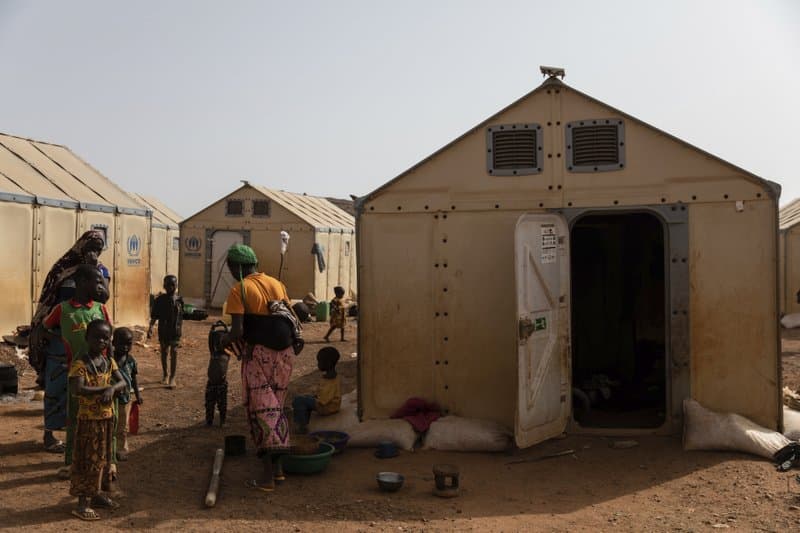YAOUNDÈ, Cameroon – A leading Catholic humanitarian agency has described the border between Burkina Faso and Togo as “a breeding ground for violence.”
The two African countries share a 80-mile border, separated only by a dried-out riverbed.
Lucie Amadou of Catholic Relief Services says there has been an uptick in jihadist attacks in the border region in recent years.
“Although the border between Togo and Burkina Faso has been confronted with increasing numbers of attacks by extremists in recent years, at present it is not necessarily a flashpoint for violence but a breeding ground for violence,” she said.
Catholic Relief Services is the international development arm of the U.S. bishops’ conference. Amadou is the organization’s head of programming in Togo.
“Although the Togo-Burkina border is not currently a hotbed of violence, the porous nature of the border makes it easier for members of extremist groups to recruit youth,” Amadou told Crux.
“Moreover, the zone has seen increased intra-community conflict, poverty, low literacy, and limited economic opportunities that result in social, political, and economic marginalization, making youth and other disenfranchised groups vulnerable to violent extremism,” she explained.
Burkina Faso has seen numerous jihadist attacks in recent years, which have destabilized the country, which is a quarter Christian and 60 percent Muslim. Togo is nearly half Christian, with Muslims making up around 15 percent of the population.
There are fears Al Qaeda and Islamic State Group terrorists could try and spread their influence from Africa’s Sahel region to the countries along the Gulf of Guinea: Benin, Togo, Ghana and Ivory Coast.
Catholic Relief Services is introducing programs it hopes will help stem the spread of jihadist activity in the region.
At the Togo-Burkina Faso border, CRS received funding in December for a new cross-border social cohesion project called “Naatann Burkina-Togo” (Fraternity Burkina-Togo), targeting the towns of Koulpélego in Burkina Faso and Cinkanssé in Togo.
The two-year $1.75 million project is funded by the German government with money from the Development Bank-KFW and through the PATRIP Foundation.
“The overall objective of the project is to promote the stabilization of cross-border areas by building peaceful and resilient communities along the Burkina-Togo border,” Amadou said.
She said three intermediate outcomes have been identified to achieve those objectives. First, local government stakeholders have to engage with conflict-affected and vulnerable communities to achieve development and infrastructure priorities; second, ensure that affected youth and women access community-based financial services and engage in peace initiatives; and third, make sure that conflict-affected and vulnerable communities benefit from improved community infrastructure.
“To help restore peace in the region, we will create and strengthen social and economic ties, build peace, trust, and interdependence, and reduce incentives for violent extremism,” she told Crux.
“To achieve this, the project focuses on the construction/rehabilitation of basic socio-economic infrastructure in 22 villages near the border. In addition, the project will work with the community to identify and train Ambassadors for Peace, to put a special focus on social cohesion within the populations of the project area, build peace through awareness raising, talk shows and radio broadcasts using CRS’s social cohesion methodology,” she added.
Amadou said her organization was in the active implementation phase for the project.
“We have conducted the baseline study and the in-depth analysis of the conflict using CRS’s social cohesion barometer which allowed us to have a better understanding of conflicts in the zone and helped inform our project implementation strategy.”
She said a participatory approach was used “with a strong involvement of the community and local authorities.”
She said 22 participant villages were selected, their needs mapped out, and the type of infrastructure to rehabilitate or create were selected.
“We also started our Savings and Internal Lending Communities (SILC) activities which would enable marginalized groups to be more financially stable and have created 38 SILC groups total for both countries. Moreover, we have identified the peace ambassadors who will be leading our social cohesion activities.” she explained.
Over 8000 people are expected to benefit directly from the project, while another 110,000 will draw indirect benefits
The high commissioner of the province of Koulpélogo, in Burkina Faso, Dramane Traoré, said he is delighted that his province is a beneficiary of the project.
“It is a great pleasure for me to receive such a project in my province which will strengthen social cohesion among the population,” he said.














